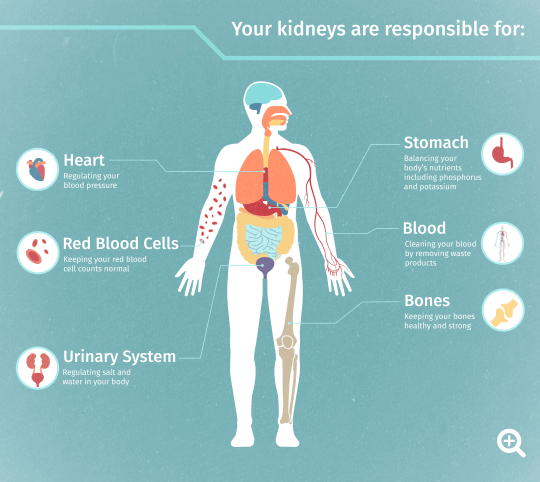Learn more
about CKD

What is CKD?
What do my kidneys do?
Your kidneys are the hardest working organs in your body. Most people have two kidneys and they are located in your lower back under your rib cage. They are about the size of your fist and shaped like kidney beans.
Your kidneys are responsible for:
- cleaning your blood by removing waste products
- regulating salt and water in your body
- helping keep your red blood cell counts normal
- regulating your blood pressure
- keeping your bones healthy and strong, and
- balancing your bodys minerals including phosphate and potassium
How your kidneys work:
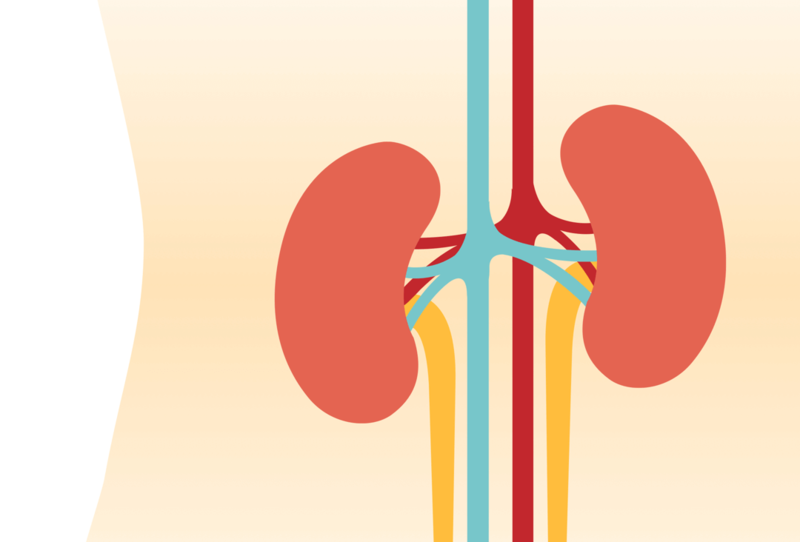
Blood enters your kidneys through a main vessel, called the renal artery. Each kidney contains many tiny filtering units called nephrons. Inside each nephron is a strainer called a glomerulus that cleans the blood. The clean blood is sent back to your body. Urine is made with the waste and the extra fluid your body does not need. From here the urine travels to the bladder through a tube caller the ureter.
If your kidneys are not working well, this can cause:
- a buildup of fluids and waste
- high blood pressure,
- anemia which is a low number of red blood cells
What is chronic kidney disease (CKD)?
Chronic kidney disease or “CKD” means that your kidneys are not working as well as they should and it covers a range of conditions that may result in long-term kidney damage. For many people, CKD will develop slowly over time, without any symptoms. Therefore, CKD may not be detected until your kidneys are no longer functioning well.
For many people, CKD will develop slowly over time, without any symptoms.
What causes CKD?
CKD typically develops over time, and is less likely to be present at birth. Two of the most common causes of CKD are diabetes and high blood pressure. Other causes include heart disease, immune diseases, and family history of kidney disease.
Are you at risk for CKD?
There are many things that can increase your chances of getting CKD. The most common risks are diabetes and high blood pressure. Other risk factors include:
- age
- heart disease
- obesity
- smoking
Take the Kidney Foundation of Canada (KFOC) quiz at www.kidney.ca/risk to find out if you are at risk.
Kidney function levels & how to slow CKD progression:
There is no cure for CKD, but early diagnosis and treatment may slow down or stop progression. Active involvement in managing your CKD, such as making dietary changes, keeping active, and taking prescribed medications, is key to slowing down the disease. If your CKD gets worse it may lead to kidney failure. This will require a kidney transplant, dialysis, or other options for cleaning blood and regulating fluid in your body.
How can I manage my CKD?
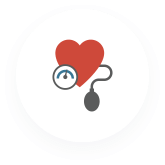
Control your blood pressure
High blood pressure can damage the filters in your kidneys, and can also increase your risk of heart disease. Good blood pressure control is one of the best ways to slow the progression of your kidney disease.

Control your diabetes
If you have diabetes, keeping your blood sugar well controlled will help protect the blood vessels and filters in your kidneys from getting damaged, which can slow the progression of your kidney disease.
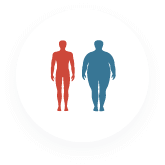
Maintain a healthy weight
If you are overweight, losing even a small amount of weight can help you control your blood pressure and blood sugar, and help slow the progression of your kidney disease. If you are underweight, your ability to fight infections and your energy level will be reduced.
Stop smoking
Smoking can damage the blood vessels in your kidneys and can increase the progression of your kidney disease.
How is CKD diagnosed?
There are 2 main tests to assess how well your kidneys are functioning:
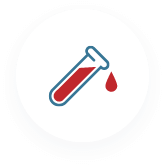 Blood test:
Blood test:
A blood test is used to measure how well your kidneys are filtering the blood. This test is called creatinine and is used to estimate the glomerular filtration rate or eGFR. The eGFR is a rough percentage of your kidney function.
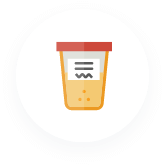 Urine test:
Urine test:
A urine test looks for things that are not normally found in urine like blood and protein. When your body gets rid of waste via your kidneys, protein should be kept in your bloodstream. The specific protein that is measured is called albumin.
What do my lab test results mean?
eGFR:
An eGFR greater than 90% indicates that you have normal kidney function. As people age it is normal for their eGFR to become lower. If your CKD reaches an advanced stage such as 30% or below, you should be referred to a kidney doctor, also called a nephrologist.
Urine:
If your urine contains protein, you may be at increased risk for progression of CKD.
How often should I get my lab tests done?
- If you have diabetes or high blood pressure, you should have your blood and urine tests done every year.
- If you do not have one of these conditions, ask your family doctor or kidney doctor (Nephrologist) how frequently you should have your kidney function tested.
What are the different levels of kidney function?
eGFR greater than 90%
Normal kidney function. Your kidneys are still working well - if there is damage you will not see any thing out of the ordinary until the disease progresses further.
eGFR 60-89%
There is mild kidney damage. At this level of kidney function, it is important to manage your blood pressure and make healthy lifestyle choices, such as eating a healthy diet and being physically active.
eGFR 30-59%
There is moderate kidney damage. It is important to learn more about managing your CKD including following recommendations for diet, medications and lifestyle.
eGFR 15-29%
There is severe kidney damage. It is important to see a kidney doctor, called a nephrologist, and follow prescribed recommendations for diet, medication, and lifestyle.
eGFR less than 15%
Your kidneys are getting close to kidney failure. At this level of kidney function you will want to discuss treatment options such as preparing for dialysis or transplant or considering conservative care.
